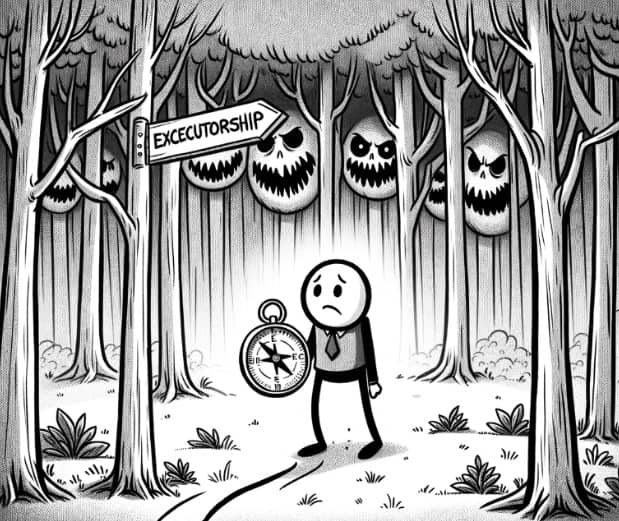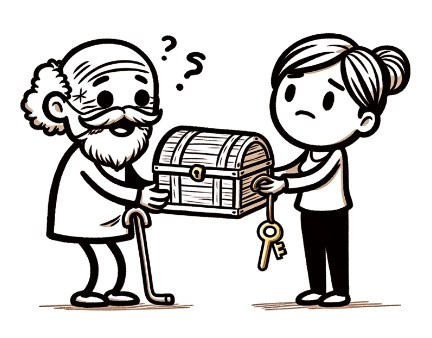Managing a loved one’s estate in North Carolina can feel like walking through a deep forest with no map or supplies. You’re handed a compass and asked to follow the signs toward “Executorship.” This is a role critical in the journey of estate administration.

But what does it mean to be an executor? In essence, it’s about stepping into the shoes of the deceased. You take responsibility to honor their final wishes and settle their estate according to the law. It’s a position of trust, requiring you to act with both diligence and empathy.
In North Carolina, the path to fulfilling this role is outlined by specific procedures and legal obligations. These guiding rules guide you through the process. From identifying assets to addressing debts and taxes, you will follow the path. And, ultimately, you will arrive at the distribution of the estate to its beneficiaries. Your role is one that brings both challenges and significant responsibilities.
With the right knowledge and resources, it can also be a deeply rewarding experience. You have the honor of caring for the last wishes of the deceased in the most respectful and loving way.
If you’re stepping into the role of an executor, understanding the nuances of this responsibility is crucial. Let’s explore what it means to be an executor, the steps involved in the process, and the challenges you may face along the way.
With a blend of empathy, legal insight, and practical advice, we’ll walk you through the complexities of executorship, ensuring you’re equipped to manage this important duty with confidence and care.
Estate Settlement: Duties of an Executor in North Carolina
Imagine you’ve been given the key to a treasure chest, but instead of gold and jewels, it’s filled with tasks, responsibilities, and the legacy of someone dear.

As an executor in North Carolina, you’re entrusted with this key, and it’s your duty to honor the wishes of the departed, ensuring their estate is settled with respect and care while adhering to strict legal requirements.
Overseeing Affairs
The role of an executor is like being a steward, overseeing the transition of another’s earthly affairs with diligence and integrity. Your journey begins with taking inventory, not just of physical items, but of the decedent’s entire estate.
This means everything from the cozy little beach house to the dusty old stocks and bonds. You’re the detective, piecing together the financial puzzle they’ve left behind.
Debts and Taxes
Next up, debts and taxes—perhaps the least glamorous part of your role, but crucial.
You’ll settle outstanding debts, ensuring that everything is paid off according to North Carolina law. It’s like balancing the books, making sure every creditor is accounted for and that the estate is in good standing.
This step is guided by statutes in NCGS 28A, ensuring you have a clear path to follow.
Distributing Estate Assets to Heirs
With the estate’s debts settled, you’ll then distribute the remaining assets. This is where the decedent’s wishes, as outlined in their will, become your guide.
You’re the conductor, ensuring each beneficiary receives their portion of the estate. If there’s no will, you’ll navigate this process according to the state’s intestacy laws, which act as a default roadmap for distribution.
Communication Skills
Throughout this process, you’re also the communicator, keeping beneficiaries in the loop and working transparently. It’s about trust, after all.
You’re not just managing assets; you’re handling people’s expectations, emotions, and, sometimes, their frustrations.
Your ability to communicate clearly and compassionately can make all the difference.
Wrapping Up the Estate for the Probate Court
Lastly, you’ll wrap up the estate. This means filing final tax returns, closing accounts, and ensuring that every aspect of the estate is settled. It’s the last page of the chapter, where you can finally rest, knowing you’ve fulfilled your duties with honor and respect.
Being an executor is no small task—it’s a role that requires patience, organization, and a heartfelt commitment to doing right by someone who’s chosen you to carry out their final wishes.
While the path may seem daunting, remember it’s paved with the trust and love of the person who passed this key to you. And with the statutes of North Carolina as your guide, you’re well-equipped to navigate this journey with confidence.
Challenges Faced by Executors
The multifaceted process of estate administration in North Carolina can feel daunting starting out. While it’s an honor to be chosen as an executor, it’s also a role that comes with its own set of challenges and obstacles.
But fear not, for understanding these challenges is the first step in overcoming them.
Paperwork and Legal Requirements
One of the first hurdles you might encounter is the sheer volume of paperwork and legal requirements. From filing the will with the court to managing the estate’s taxes, the bureaucratic aspects can feel overwhelming. It’s like being asked to speak a language you’ve never learned overnight.
The key here is organization and patience. And remember, resources are available to help guide you through this process.
Grieving Family Members
Another common challenge is dealing with the emotional dynamics of grieving families. As an executor, you’re not just managing assets; you’re also navigating a landscape of emotions and sometimes conflicting interests.
It’s a delicate dance, balancing fairness and sensitivity. This is especially true when it comes to distributing personal items without high monetary value but with significant sentimental value.
Managing Estate Assets
Then there’s the responsibility of managing the estate’s assets, which can be particularly daunting if the estate is large or includes complex investments. You might find yourself suddenly in charge of real estate, stocks, or even a family business.
It’s a bit like being thrust into the role of a financial manager, a job for which you might feel unprepared. Here, seeking professional legal advice is not just advisable; it’s often necessary.
Potential Challenges to the Last Will and Testament
Furthermore, executors must also be vigilant against potential legal challenges to the will, which can arise from dissatisfied beneficiaries or disputes over the will’s validity.
Staying informed and seeking legal counsel can help you steer through if this happens.
Settling Debts and Taxes
Lastly, the task of settling debts and taxes can present its own complexities. Understanding which debts are legitimate and how to prioritize them, all while ensuring the estate is in compliance with both federal and state tax laws, is a monumental task.
Executorship is a balancing act. You must ensure that each creditor is fairly paid while trying not to compromise the estate’s ability to provide for the beneficiaries.
A Purposeful Role
Despite the challenges, being an executor is also a role filled with purpose and the opportunity to make a significant difference in the lives of the beneficiaries. It’s about carrying out someone’s final wishes, a task that, while daunting, can also be incredibly rewarding.
With the right approach, support, and resources, you can navigate these challenges successfully, honoring the trust that has been placed in you.
Remember, you’re not expected to have all the answers from day one, but with diligence, dedication, and maybe a bit of help, you’ll find your way through.
Rights of an Executor in North Carolina
An executor settles an estate in a way that honors a deceased person’s last wishes and adheres to the law.
However, as much as executorship involves responsibilities and duties, it also comes with a set of rights designed to empower you to perform your role effectively and protect you in the process.
First off, it’s essential to understand that as an executor, you’re not just a volunteer; you’re acting in a capacity recognized and protected by North Carolina law.
You Have Legal Authority As An Executor
You have the legal authority to access the deceased person’s assets, from bank accounts to other financial institutions. Interacting with government agencies on behalf of the estate is also common. This access is crucial for gathering the estate’s assets and ensuring they are managed correctly during the estate settlement process.
Moreover, the probate court that oversees the estate settlement process is there to offer clarity on the law and your duties. This judicial backing gives you a legal framework.
Right to Get Help
One of the key rights you hold as an executor is the ability to seek advice and services. This could mean hiring a professional, such as an:
- Attorney to navigate the complexities of probate law
- Accountant to manage the estate’s finances
- Real estate agent to assist with selling property
- Appraiser to assess valuable personal property
The cost for these services is usually covered by the estate, recognizing that managing an estate often requires expertise beyond what’s expected of a layperson.
Compensation
In terms of compensation, North Carolina law acknowledges the time commitment and effort involved in executorship.
Executors are entitled to reasonable compensation for their services, which is particularly important when the estate is large or involves complicated assets. This compensation is not about profiting from the role but rather about recognizing the significant work and responsibilities involved.
Fiduciary Duty
It’s also worth noting that as an executor, you have a fiduciary duty to act in the best interest of the estate and the named beneficiaries. This duty comes with the right to make decisions that you believe best serve the estate’s interests, even if they might not please all heirs or beneficiaries.
Your primary duty is to the decedent’s wishes and the estate’s well-being, not to cater to the preferences of every individual involved.
Lastly, remember that while the role comes with responsibilities, you’re not expected to shoulder them alone. As an executor, you have the right to assemble a team, bringing together the expertise needed to settle the estate efficiently and effectively.
This might include co-executors, close friends of the deceased who can provide insight into their wishes, or adult children who can assist with the practical aspects of managing properties and other assets.
In summary, executorship is a role that balances duties with rights, offering you the legal authority, resources, and support needed to navigate the process. By understanding and exercising these rights, you can accomplish the following:
- Protect the estate
- Fulfill your obligations
- Ensure the decedent’s wishes are honored
- Manage the complexities of estate settlement with confidence and care
FAQs on Executorship in North Carolina
1- Q: Who can be named as an executor in North Carolina?
A: In North Carolina, almost any adult can be named an executor in a last will. However, they must be of sound mind and not a convicted felon. It’s common to appoint a trusted family member, such as an adult child, but friends or attorneys can also serve.
The key is choosing someone who can manage the estate’s assets and fulfill the duties involved with diligence and integrity.
2- Q: What if the named executor doesn’t want to serve?
A: Being an executor is voluntary. If the person named in the last will doesn’t want to serve, they can formally renounce their appointment.
The probate court will then appoint an alternate executor, often another person named in the will or a close family member.
3- Q: Are executors compensated for their work in North Carolina?
A: Yes, executors are entitled to reasonable compensation for their services. This is to acknowledge the time, effort, and responsibility involved in managing the estate settlement process. This process includes distributing assets, paying debts, and ensuring they honor the deceased person’s wishes.
4- Q: Can an executor be personally liable for debts of the deceased?
A: Executors are not personally liable for the deceased’s debts as long as they act in accordance with the law. However, they legally do need to pay the estate’s debts from the estate assets before distributing inheritances.
If they distribute assets before settling debts, they can face liability for those debts.
5- Q: What should I do if I’m named executor and there are no assets in the estate?
A: If the estate has no assets, it may not need to go through the full probate process. However, you still must file the last will with the probate court.
If there are debts but no assets to pay them, the estate is insolvent, and you may need to notify creditors. Consulting with a probate lawyer can help you understand your responsibilities in this situation.
6- Q: How do I manage estate assets that are in financial institutions or involve government agencies?
A: As the executor, you’ll have the authority to access the deceased’s assets in financial institutions. You’ll also deal with government agencies by presenting the death certificate and your appointment documents.
This access allows you to gather assets, pay expenses, and manage the estate in accordance with the last will.
7- Q: What happens if heirs disagree with my decisions as an executor?
A: Disagreements can arise, especially in emotionally charged situations. As an executor, your primary duty is to the decedent’s wishes and the estate’s best interest.
It’s important to communicate clearly with heirs and provide explanations for your decisions. If disputes continue, seeking legal advice or mediation might be necessary to resolve conflicts.
8- Q: Do I need a lawyer to serve as an executor?
A: While many states, including North Carolina, don’t require executors to hire a lawyer, obtaining legal counsel can be invaluable, especially for complex estates.
An estate administration lawyer can help you navigate the probate process, manage legal and tax obligations, and ensure you know how to fulfill your duties effectively.
9- Q: Can there be co-executors, and how does that work?
A: Yes, a will can name multiple people to serve as co-executors. This team approach can be beneficial for dividing the workload, especially for large or complex estates.
However, co-executors must collaborate and agree on decisions, which requires clear communication and a shared commitment to the estate’s best interest.
10- Q: How long does the estate settlement process take in North Carolina?
A: The duration can vary widely depending on the estate’s complexity, the clarity of the last will, and whether there are any disputes among heirs or creditors. On average, the process can take anywhere from several months to over a year.
Executors must balance thoroughness with efficiency to settle the estate as promptly as possible while ensuring all legal and financial obligations are met.
An Experienced Estate Administration and Probate Attorney Can Help
At Hopler, Wilms, and Hanna, we understand the complexities and emotional challenges that come with navigating the probate and estate administration process. Our team brings a wealth of experience and a compassionate approach to every case, ensuring that you have the support and guidance needed to fulfill your duties as an executor with confidence.
We simplify the legal landscape, translating complex statutes into actionable steps to provide you with a clear path forward.
Handling Estates with a Comprehensive Suite of Services
Our attorneys are well-versed in North Carolina law and are equipped to handle estates of all sizes and complexities. We offer a comprehensive suite of services, from filing the initial probate documents to managing the final distribution of assets. We also stand ready to address any disputes that may arise, always aiming to resolve conflicts in a manner that preserves family relationships and honors the wishes of the deceased.
Transparent Communication
We believe in proactive communication and transparency throughout the estate administration process. Our team keeps you informed at every step, ensuring that you understand your options and the implications of your decisions. We also recognize the importance of accessibility.
Our attorneys are always just a phone call or email away, ready to answer your questions and provide the reassurance you need during this challenging time.
Tailored Legal Strategies
Moreover, we offer personalized legal strategies tailored to the unique needs of each estate. Whether you’re dealing with a straightforward estate settlement or navigating the complex world of intestacy laws, our team has the experience to guide you efficiently and effectively.
Estate Planning and Trust Administration
We also provide assistance with related issues, such as estate planning and trust administration, making our firm a one-stop solution for all your estate-related legal needs.
Partner With Us
At Hopler, Wilms, and Hanna, we’re not just your attorneys; we’re your partners in estate administration. We take pride in our ability to protect your interests and those of the estate, ensuring that the legacy of the deceased is honored and that the beneficiaries receive what they are due. Let us help you manage the responsibilities of executorship with the dignity, respect, and legal excellence you deserve.
Get in touch with us if you would like to lift the veil on estate administration in North Carolina and receive professional help.

